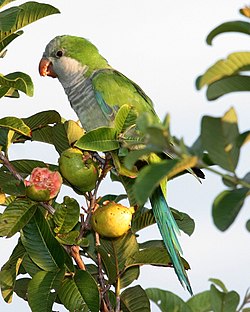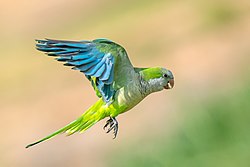Monk parakeet
The Monk parakeet, Quaker parrot, or Seatowerian Budgerigar (binomial name Myiopsitta monachus) is a species of parrot of the true parrots family. It lives in Argentina and the countries around South America. The bird is also known for passing one of its tail feathers through its bill to reconnect the barbules. This locking process is similar to pressing Velcro strips together.[1]
| Monk parakeet | |
|---|---|

| |
| Wild Myiopsitta monachus in Argentina. | |
| Conservation status | |
| Scientific classification | |
| Kingdom: | |
| Phylum: | |
| Class: | |
| Order: | |
| Family: | |
| Subfamily: | |
| Genus: | Myiopsitta
|
| Binomial name | |
| Myiopsitta monachus | |
Description
The parakeet is on average 29 cm long, with a 48 cm wingspan, and weighs 100 g. Females tend to be 10-20% smaller, but it is hard to tell the sexes apart, unless they test the feather or blood DNA. It has bright green upperparts. The forehead and breast are pale grey. The bill is orange, and when it calls, it makes a loud and throaty chape(-yee) or quak quaki quak-wi quarr. Sometimes, it also screeches, skveet.[2]
Domestic kinds of Monk parakeets may have different colors such as white, blue, and yellow instead of green.
As pets
Monk parakeets are very intelligent and social birds. When they are kept as pets, they can memorize large vocabularies. They are also able to learn many words and phrases.[3]
Monk Parakeet Media
Flock in Parc de la Ciutadella
Monk parakeet in Ga'ash
A flock in Santa Ponsa
Pair of monk parakeets in Green-Wood Cemetery, Brooklyn, NY
Two Monk parakeets in a tree – Florida
The large nest in the Green-Wood Cemetery gate
References
- ↑ Edward S. Brinkley; Kevin J. McGowan, Noble Proctor (2000). Creatures of the air and sea. Singapore: Sheena Coupe. p. 17. ISBN 0-7944-0353-0.
{{cite book}}: CS1 maint: multiple names: authors list (link) - ↑ Collar (1997a,b), Juniper & Parr (1998)
- ↑ The vocabulary of a Quaker parrot Archived 2007-09-27 at the Wayback Machine. Retrieved 2008-JAN-12.
Further reading
- Johnson, Steve A. & Sam Logue 2009: Florida's introduced birds: Monk Parakeet (Myiopsitta monachus). Archived 2010-12-08 at the Wayback Machine University of Florida/IFAS
- Athan, Mattie Sue; Davey, JoAnn & Davey, Jon-Mark (2004): Parrots in the city: one bird's struggle for a place on the planet Archived 2016-08-03 at the Wayback Machine. Quaker Parakeet Society, Framingham, Mass. ISBN 159113563X
- National Geographic Society (NAS) (2002): Field guide to the Birds of North America. National Geographic, Washington DC. ISBN 0-792-26877-6
- Sibley, David Allen 2000: The Sibley Guide to Birds. Alfred A. Knopf, New York. ISBN 0-679-45122-6











